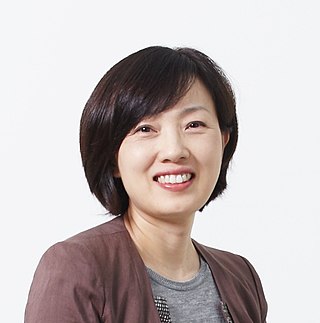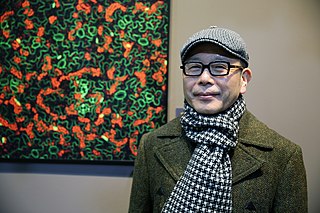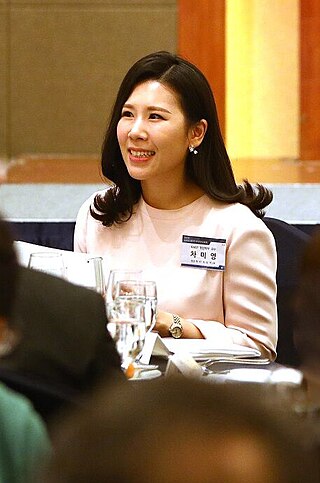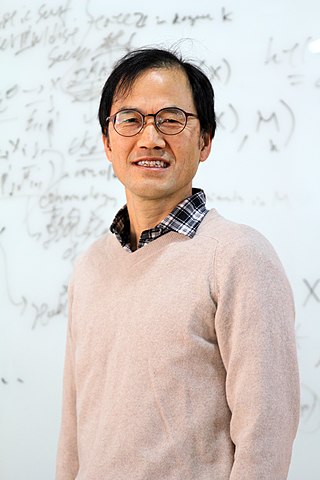Related Research Articles
The National Academy of Sciences of the Republic of Korea (Korean: 대한민국학술원),is the senior national organization of distinguished Korean scientists and scholars. It was founded to promote learning and research in all areas of sciences by conferring membership and preferential treatment to those who have made outstanding contributions to the advancement of sciences and learning. The Academy consists of 150 Fellows who are selected by their peers for their contributions to the sciences and education.

V. Narry Kim is a South Korean biochemist and microbiologist,best known for her work on microRNA biogenesis. Her pioneering studies have laid the groundwork for the biology of microRNA and contributed to the improvement of RNA interference technologies.

Ryoo Ryong FRSC is a distinguished professor of chemistry at KAIST in Daejeon,South Korea. He was the head of the Center for Nanomaterials and Chemical Reactions,an Extramural Research Center of the Institute for Basic Science. Ryoo has won a variety of awards,including the Top Scientist and Technologist Award of Korea given by the South Korean government in 2005. He obtained the KOSEF Science and Technology Award in 2001 for his work on the synthesis and crystal structure of mesoporous silica.

Noh Tae-won is a South Korean physicist and director of the Center for Correlated Electron Systems (CCES) in the Institute for Basic Science (IBS) at Seoul National University (SNU). He has published more 400 papers and been cited 15,000 times. He is a member of the Materials Research Society,Korean Optical Society,Korean Crystallographic Society,and Association of Asia Pacific Physical Societies and been on several editorial boards for journals. In 2017,he became president of the Korean Dielectrics Society.

Yeom Han-woong is a South Korean physicist. A tenured professor at POSTECH,he has led several research centers for the university and from 2013 in collaboration with the Institute for Basic Science. He is a Fellow of the American Physical Society and has served as vice chairman of the Korean government's first science and technology advisory group for three consecutive terms. With more than 300 publications to his name,his research has been cited over 5,000 times giving him an h-index of 40 and i10-index of 125.

Hee-sup Shin is a South Korean neuroscientist whose work focuses on brain research of genetically engineered mice via gene knockout in order to better understand the human brain. His research resulted in him being named a National Scientist by the Korean Ministry of Science and Technology. He is a former co-director of the Center for Cognition and Sociality leading the Social Neuroscience Group in the Institute for Basic Science (IBS) located at Korea Advanced Institute of Science and Technology (KAIST).

Nam Chang-hee is a South Korean plasma physicist. Nam is specializing in the exploration of relativistic laser-matter interactions using femtosecond PW lasers. Currently he is professor of physics at Gwangju Institute of Science and Technology and director of the Center for Relativistic Laser Science as a part of the Institute for Basic Science (IBS).

Hong Gil Nam is a South Korean biologist teaching in the Department of New Biology of Daegu Gyeongbuk Institute of Science and Technology and leading research as director of the Center for Plant Aging Research. His research interests include comparative aging in diverse kingdoms,including plant and animals,to reveal aging mechanisms among species,cross-kingdom interaction between plants and animals,and biochemistry at nano and micro levels. He is the founder and former director of the Biological Research Information Center,a member of the Korean Academy of Science and Technology,and has served on the editorial board in Molecular Plant since 2013.

Koh Gou Young is a researcher from South Korea studying organ vasculature and lymphatic vessels with an interest in angiogenesis,lymphangiogenesis,adipogenesis,and cardiogenesis. His research has contributed to the publication of more than 200 journal articles,including multiple publications on how Tie2 deficits are related to sepsis,blood-retinal barrier damage,and an imbalance of intraocular pressure in Schlemm's canal which induces glaucoma.

Jun-Muk Hwang is a South Korean mathematician,specializing in algebraic geometry and complex differential geometry.
The Korea Science Award is an award presented to South Koreans and Korean scientists working in domestic universities or research positions. It is currently jointly presented by the Ministry of Science and ICT and the National Research Foundation of Korea. Research achievements are limited to that of a single project conducted in Korea. Potential recipients go through a several stage review which includes consolation with foreign scholars.

Cha Meeyoung,sometimes known as Mia,is an associate professor at KAIST in the School of Computing and a chief investigator in the Pioneer Research Center for Mathematical and Computational Sciences at the Institute for Basic Science. Her research focuses on network and data science with an emphasis on modeling,analyzing complex information propagation processes,machine learning-based computational social science,and deep learning. In June 2024,she will become the scientific director of the Max Planck Institute for Security and Privacy. She has served on the editorial boards of the journals PeerJ and ACM Transactions on Social Computing.

Choi Kiwoon is a theoretical particle physicist researching focusing on particle theory and cosmology. He was a research professor at Chonbuk National University and a full professor at KAIST. He is the founding director of the Institute for Basic Science Center for Theoretical Physics of the Universe. He is a member of the Korean Academy of Science and Technology.

Changjoon Justin Lee is an American neuroscientist specializing in the field of glioscience. He served as the Director of Center for Neuroscience at the Korea Institute of Science and Technology and later founded the WCI Center for Functional Connectomics as part of the World Class Institute Program. In 2015,he established the Center for Glia-Neuron Interaction before becoming co-director of the IBS Center for Cognition and Sociality and head of the Cognitive Glioscience Group in 2018. He has been on the editorial boards of the journals Molecular Brain and Molecular Pain and is a chief editor of Experimental Neurobiology.
Lev Rafailovich Kontsevich is a Soviet-Russian orientalist and Candidate of Sciences,who created the Kontsevich system,the one of cyrillization system for the Korean language and currently the main system of transcribing and transliterating Korean words into the Cyrillic alphabet. He is also the father of mathematician Maxim Kontsevich.

Oh Yong-Geun is a mathematician and distinguished professor at the Pohang University of Science and Technology and founding director of the IBS Center for Geometry and Physics located on that campus. His fields of study have been on symplectic topology,Floer homology,Hamiltonian mechanics,and mirror symmetry He was in the inaugural class of fellows of the American Mathematical Society and has been a member of Institute for Advanced Study,Korean Mathematical Society,and National Academy of Sciences of the Republic of Korea and is on the editorial boards of Journal of Gokova Geometry and Topology and Journal of Mathematics of Kyoto University.
Top Scientist and Technologist Award of Korea (Korean: 대한민국최고과학기술인상) is one of two annual awards given in South Korea by the Korean Federation of Science and Technology Societies with the other being a government award for contribution to science and technology promotion. The Top Scientist and Technologist Award of Korea was started in 2003 as the successor to the Science and Technology Award of Korea which was established in 1968. The award is to foster honor and pride and create an environment in which people can focus on research and development by discovering and encouraging scientists and engineers with outstanding achievements who can represent South Korea. While previously given to multiple individuals,from 2003 only person is selected for each cycle. Laureates receive the award and 300 million KRW cash prize.
The Inchon Award (Korean: 인촌상) is a prize given to individuals in public service,journalists,and academics for achievements in their field. The award is named after the nickname of Kim Seong-su;the second Vice President of South Korea and founder of Korea University,The Dong-a Ilbo and Gyeongseong Textiles. The annual award is presented with a prize of KRW 100 million,a citation and a medal on October 11 which is Kim's birthday.
References
- ↑ 조현미 (15 September 2022). "남풍현·김택민·최선웅·이상엽 등 8명 대한민국학술원상 수상" (in Korean). Aju Daily. Retrieved 17 January 2023.
- ↑ 권예슬 (27 September 2021). "황준묵 단장, '제66회 대한민국학술원상' 수상". Institute for Basic Science (in Korean). Retrieved 17 January 2023.
- ↑ "National Academy of Sciences of the Republic of Korea Act". Korea Legislation Research Institute. Retrieved 17 January 2023.
- ↑ "대한민국학술원상(大韓民國學術院賞)". Encyclopedia of Korea Culture (in Korean). Retrieved 17 January 2023.
- ↑ 정혁수 (16 September 2022). "대한민국학술원상에 서울대 이석하 교수 등 8명". Money Today (in Korean). Retrieved 17 January 2023.